Experts have warned that regular consumption of game meat, a.k.a bush meat, and organ meats like liver can lead to the build-up of uric acid in the blood.
According to the experts at the Cleveland Clinic, “if untreated, high uric acid levels may eventually lead to permanent bone, joint and tissue damage, kidney disease and heart disease.”
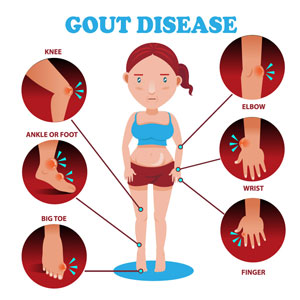
Researchers also warn about a link between high uric acid levels and type 2 diabetes, high blood pressure, and fatty liver disease.
In the most bizarre of cases, a person’s dietary habit can cause uric acid build-up in the blood, while other causes can be out of one’s control.
Other causes of high uric acid level in blood
To be sure, other causes of a high uric acid level in the blood include:
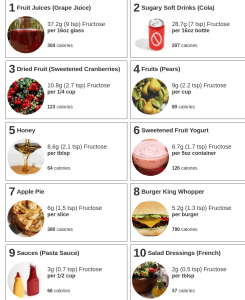
- Diuretics (water retention relievers)
- Drinking too much alcohol
- Drinking too much soda or eating too much of foods that contain fructose, a type of sugar
- Genetics also known as inherited traits
- High blood pressure (hypertension)
- Immune-suppressing drugs
- Kidney problems
- Leukemia
- Metabolic syndrome
- Niacin, also called vitamin B-3
- Obesity
- Polycythemia vera
- Psoriasis
- A purine-rich diet, high in foods such as liver, game meat, anchovies and sardines
The irony of the purine is that it is one of the two chemical compounds that cells use to make the building blocks of DNA and RNA. Examples of purines are adenine and guanine.
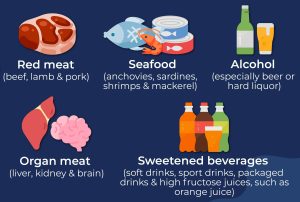
However, purines are also found in meat and meat products; and they are broken down by the body to form uric acid, which is passed in the urine.
It is sensible, therefore, to be careful with how much meat we eat, since our body already has the chemical compound.
Again, ordinarily, Niacin or Vitamin B-3 helps to convert nutrients into energy, create cholesterol and fats, create and repair DNA, and exert antioxidant effects.
Vitamin B-3 helps maintain our nervous system, digestive system and skin health. Niacin (or vitamin B-3) is often part of a daily multivitamin, but most people get enough niacin from the food they eat. Foods rich in niacin include yeast, milk, meat, tortillas and cereal grains.
How to prevent or tackle high uric acid with food
Mercifully, with the right dietary habits, you can prevent high uric acid in the blood or lower it under the guidance of a competent medical expert.
Experts say that eating right prevents illness and also reduces the harsh fallout of illness or disease when it happens.
It is recommended that in order to reduce high uric acid in the blood, you should eat more fruits, whole grains, and certain beverages as follows:
Bananas
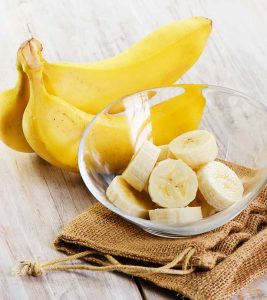
Eating a banana daily can reduce the uric acid level in your blood, as bananas are naturally very low in purine—a natural compound that breaks down into uric acid—thus making it a good choice for you.
Apples
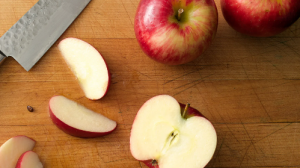
Apples have a high dietary fibre content, which helps in lowering uric acid levels. Fibre absorbs uric acid from the bloodstream and eliminates the excess uric acid from your body. Moreover, apples are also rich in malic acid, which tends to neutralize the effects of uric acid in the body.
Other foods rich in malic acid are cherries, grapes, mangoes, strawberries, nectarines and oranges. So also are vegetables such as broccoli, beans, carrots, peas, and potatoes.
Cherries
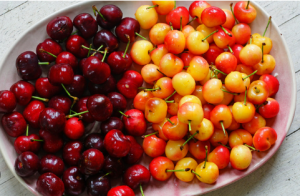
A study published in the journal Arthritis and Rhemotology states that, among others, cherries also prevent uric acid from crystallising and depositing in your joints, which is the main cause behind the gout.
Citrus fruits
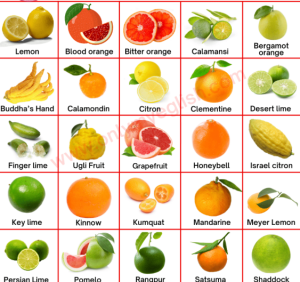
Nutritionists say fruits like oranges and lemons are a rich source of vitamin C and citric acid. Including these foods can help you maintain healthy uric acid levels in the body, since they can efficiently flush out the excess.
Green tea
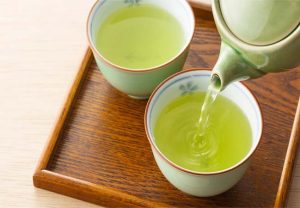
Several studies prove that, in addition to aiding weight loss, green tea extracts can also lower uric acid production in the body, thus making it a good beverage for those who have high levels of uric acid in their blood.
Bottom line
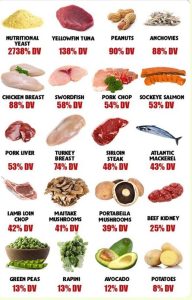
Most of the foods that can cause high uric acid levels in the blood are what most of us are raised on. They are the readily available foods in our environment and there is hardly anything we can do about that.
What nutritionists and other health experts advise, however, is to eat moderately and to ensure that we eat balanced diet.
In other words, learn to combine your foods in such a way that you are neither too much to the left or too much to the right!


